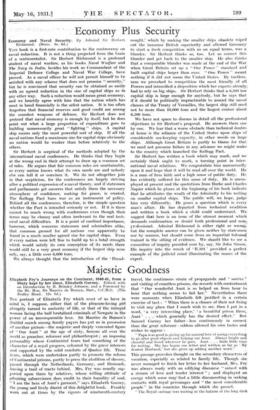Economy Plus Security
Economy and Naval Security. By Admiral Sir Herbert Richmond. (Bean. 8s. 6d.)
Tins book is a first-rate contribution to the controversy on naval reduction. It is not a thing projected from the brain of a sentimentalist. Sir Herbert Richmond is a . profound student of naval warfare, as his books Naval Warfare and The Navy in India, besides his work as Commandant of the Imperial Defence College and Naval War College, have proved. As a naval officer he will not permit himself to be satisfied with any scheme that does not promise !` but he is convinced that security can be obtained as easily with an agreed reduction in the size of capital ships as in any other way. Such a reduction would mean great economy, and we heartily agree with him that the nation which has most in hand financially is the safest nation. It is too often forgotten that financial reserves and good credit are among the soundest weapons of defence. Sir Herbert does not pretend that naval economy is enough by itself, but he does point out what a large proportion of expenditure goes to building unnecessarily great " fighting " ships. A capital ship means only the most powerful sort of ship. If all the naval nations fixed a maximum size for capital ships obviously no nation would be weaker than before relatively to the others.
Sir Herbert is sceptical of the methods adopted by the international naval conferences. Ile thinks that they begin at the wrong end in their attempt to draw up a common set of rules. He argues that fair common rules are unattainable, as every nation knows what its own needs are and nobody else can tell it or convince it. We do not altogether join in that scepticism, for the conferences are largely striving after a political expression of a naval theory, and if statesmen and parliaments get answers that satisfy them the necessary atmosphere of confidence, making for peace, is created. The Kellogg Pact bans war as an instrument of policy. Behind all the conferences, therefore, is the simple question whether the Pact is intended seriously or not. If it is there cannot be much wrong with conferences even though their terms may be clumsy and often irrelevant to the real tech- nical naval difficulties. It is a point of cardinal importance, however, which concerns statesmen and admiralties alike, that common ground for all nations can apparently. be found in a much smaller agreed size for capital ships. Even if every nation were left free to build up to a .total .strength which would satisfy its own conception of its needs there would still be a very great economy if the largest-ship were only, say, a little over 6,000 tons.
We always thought that the introduction of the ' Dread-
nought,' which by making the smaller ships obsolete wiped out the immense British superiority and allowed Germany to start a fresh competition with us on equal terms, was a blunder. Sir Herbert thinks so, too. Let us correct this blunder and get back to the smaller ship. He also thinks that a comparable blunder was made at the end of the War- when Great Britain set up a " One Power " standard and built capital ships larger than ever. " One Power meant nothing if it did not mean the United States. By tactless- ness we provoked to competition the most friendly of all. Powers and intensified a disposition which her experts already, had- to rely on big ships. Sir Herbert thinks that a 6,500 ton capital ship is large enough for anybody, but he says that if it should be politically impracticable to amend the naval clauses of the Treaty of Versailles, the largest ship still need not be more than 10,000 tons and the largest cruiser about 6,500 tons.
We have not space to discuss in detail all the professional objections to Sir Herbert's proposal. He answers them one .by one. We fear that a worse obstacle than technical doubts at home is the reliance of the United States upon ships of considerable sea-keeping capacity, in other words on large ships. Although Great Britain is partly to blame for that we need not presume failure in any advance we might make to the country which launched the Kellogg Pact.
Sir Herbert has written a book which may mark, and we certainly think ought to mark, a turning point in inter- national naval relations. We congratulate him unreservedly upon it and hope that it will be read all over the world. He is a man of firm faith and a high sense of public duty. He has evidently suffered for this sense of duty. He is uncurl, ployed at present and the quotations from Burke and Charles „Napier which he places at the beginning of his book indicate that he attributes the wrath of the Admiralty to his writing on smaller capital ships. The public will, we hope, judge him very differently. He poses a question which is every mans affair. He has departed from technical erudition and written a book which a child could understand. We suggest that here is an issue of the utmost moment whicli demands confirmation or denial both professional and nookk professional. Admiral Richmond is either right or wrong;: but. the complete answer can be given neither by statesmen nor by seamen, but should come from an impartial tribune( trained in 'the sifting of evidence. We should like to see a committee of inquiry presided over by, say, Sir John Simon, His inquiry into the wreck of R.101 ' provided a perfect example of the judicial mind illuminating the mazes of the expert.


















































 Previous page
Previous page